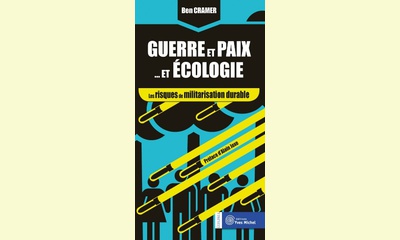|
|
Book review: War, peace, and ecology. The risks of sustainable militarization
un article par Pressenza (reprinted under Creative Commons Attribution)
The militarization of the world is the main cause of the
deterioration of our environment on land, at sea and in space. Our
planet needs intensive care as it is increasingly damaged by the very
people who claim to be its defenders: the armed forces. 
Image credit : www.yvesmichel.org
click on photo to enlarge
Limit the damage of weapons of all calibres. Counteract the
excesses in the international distribution of the death threat of the
military-industrial complex, a complex that consumes our vital
resources, occupies our territories, and militarizes our minds. Take
up the slogan "Stop Growth" of armaments, at a time when
ecosystems are victims of strategic reconfigurations due to
disruption and manipulation of the climate. Design ecological
security by neutralizing harmful preparations for war in time of
peace. This will depend on how environmentalists and pacifists
work together, without being concerned with who is best placed or
better equipped to "save" the planet.
Think ecology! We need to assess how the environmental crisis -
including the climate emergency - is related to our failure to attain
peace.
The author, Ben Cramer, co-hosted in 2008 the first European
Parliament debate on the theme of "Collective Security and the
Environment". Journalist, researcher at CIRPES and GRIP in Brussels,
co-founder of Nautilus 21, this son of a theorist of naval strategy in
the Netherlands, teaches geopolitics of sustainable development at
the University Paris .
The book is available in the Collection Société civile, ISBN 978 2
36429 052 5, Format : 12 x 22 cm, Price: 13 €
For further information and orders, click here.
(Click here for a French version of this article)
|








|
DISCUSSION
Question(s) liée(s) à cet article:
What is the relation between the environment and peace?,
* * * * *
Commentaire le plus récent:
One way to understand the relation between environment and peace is to turn the question on its head and ask what is the relation between the environment and the culture of war. Here is what I say in my book The History of the Culture of War :
The exploitation of the culture of war involves not only exploitation of people, but also exploitation of the environment. In recent years everyone has become more aware of the dangers of environmental pollution, with special attention to carbon emissions which have increased atmospheric carbon dioxide and resulted in global warming. This is also related to the loss of the world's forests which redress the problem by removing carbon dioxide from the atmosphere. Insufficient attention has been paid, however, to the great environmental destruction and pollution caused by military activity.
Historically, military-related activity has been one of the primary causes of deforestation. This was already evident in ancient times as described above in the case of Greece and Rome. More recently, the British Empire was a major destroyer of forests, as described for India in an article by Budholai (available on the Internet) :
"The early days of British rule in India were days of plunder of natural resources. . ... continuation.

|
|









